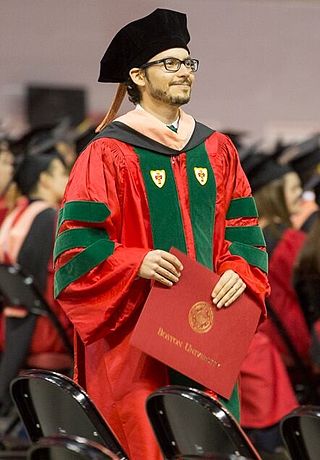
Tamara Goldman Sher, Ph.D. is a licensed clinical psychologist and professor at The Family Institute at Northwestern University. She is a leading researcher in the fields of Behavioral Medicine and Couples Therapy. Sher was awarded a $2.4 million grant from the National Heart, Lung and Blood Institute of the National Institutes of Health (NIH) which combined both of these fields in a study measuring the benefits of couples' involvement in cardiac treatment. This grant is part of Sher's work with the National Institute of Health's Behavior Change Consortium. Sher's research has been mentioned in the Chicago Tribune, Psychology Today, on Chicago Public Radio, and published in several leading psychology journals.

A Doctor of Public Health is a doctoral degree awarded in the field of Public Health. DrPH is an advanced and terminal degree that prepares its recipients for a career in advancing public health practice, leadership, research, teaching, or administration. The first DrPH degree was awarded by Harvard Medical School in 1911.
Elbert D. Glover is an American researcher and author in the field of tobacco addiction and smoking cessation. He retired as professor emeritus at the University of Maryland at College Park School of Public Health where he served as Chairperson of the Department of Behavioral and Community Health from 2005 to his retirement in 2015. He was an entrepreneur, editor, publisher, co-founder and principal owner of Health Behavior and Policy Review, and co-founder, owner, editor, and publisher of American Journal of Health Behavior and Tobacco Regulatory Science. Glover was the founder of the American Academy of Health Behavior and served as its first president from 1997 to 2001.
Noreen M. Clark was the Myron E. Wegman Distinguished University Professor, Director of the Center for Managing Chronic Disease, Professor of Health Behavior & Health Education, and Professor of Pediatrics at the University of Michigan. From 1995-2005 she served as Dean of Public Health and Marshall H. Becker Professor of Public Health at the University of Michigan. She was interested in systems, policies and programs that promote health, prevent illness, and enable individuals to manage disease.

Ovide F. Pomerleau is an American psychologist who pioneered the development of behavioral medicine. He is best known for his work on self-management problems and addiction, focusing on the behavioral, biological, and genetic bases of tobacco smoking and nicotine dependence.

Mary Jane Rotheram-Borus is a licensed clinical psychologist and professor with the University of California, Los Angeles, Department of Psychiatry and Biobehavioral Sciences. Rotheram is the professor-in-residence in the Semel Institute for Neuroscience and Human Behavior. She is the Director of the Global Center for Children and Families at UCLA and the former director of the Center for HIV Identification, Prevention, and Treatment Services.

Carolyn M. Mazure is an American psychologist and the Norma Weinberg Spungen and Joan Lebson Bildner Professor of Psychiatry and Psychology at the Yale School of Medicine. She created and directs Women’s Health Research at Yale — Yale’s interdisciplinary research center on health and gender.
Karen A. Matthews is an American health psychologist known for her research on the epidemiology and risk factors associated with cardiovascular disease, early signs of coronary heart disease risk in children, women's health and menopause, and connections between socioeconomic status and health. She is Distinguished Professor Emerita of Psychiatry and Professor Emerita of Psychology and Epidemiology at the University of Pittsburgh.
Karina W. Davidson is senior vice president of research at Northwell Health and director of the Institute of Health System Science at the Feinstein Institutes of Medical Research. She was previously vice-dean of organizational effectiveness and executive director of the Center for Behavioral Cardiovascular Health at Columbia University Medical Center. She was also Chief Academic Officer at NewYork-Presbyterian Hospital in New York City.

Marina Rachel Picciotto is an American neuroscientist known for her work on the role of nicotinic acetylcholine receptors in addiction, memory, and reward behaviors. She is the Charles B. G. Murphy Professor of Psychiatry and professor in the Child Study Center and the Departments of Neuroscience and of Pharmacology at the Yale University School of Medicine. She was named Director of the Yale University Interdepartmental Neuroscience Program in September 2023. From 2015 to 2023, she was editor-in-chief of the Journal of Neuroscience. She is currently President of the Society for Neuroscience.

Kirsten Bibbins-Domingo is an American epidemiologist and physician. She is the 17th Editor in Chief of the Journal of the American Medical Association (JAMA) and the JAMA Network. She is Professor of Epidemiology and Biostatistics and the Lee Goldman, MD Endowed Professor of Medicine at University of California, San Francisco. She is a general internist and attending physician at San Francisco General Hospital.

Brian A. Primack is a higher education administrator, medical researcher, author, and speaker with expertise in interrelationships among media, technology, and health. He is dean of the College of Health at Oregon State University. He is the author of You Are What You Click: How Being Selective, Positive, and Creative Can Transform Your Social Media Experience.
Ann Elizabeth Kurth, PhD, CNM, MPH, FAAN, FACNM is President of The New York Academy of Medicine (NYAM), a leading nonprofit organization focused on health equity; she is the first epidemiologist to lead NYAM in its 176-year history. Previously she was the dean and Linda Koch Lorimer Professor at Yale School of Nursing (YSN). She is a fellow of the National Academy of Medicine and was a member of the United States Preventive Services Task Force. She is an expert in global health and HIV with work funded by the National Institutes of Health, Bill & Melinda Gates Foundation, CDC, and others, for studies in the US and internationally. Dr. Kurth has published ~250 peer-reviewed articles, chapters, and monographs. She currently co-chairs the National Academy of Medicine Board on Global Health, which includes a focus on health issues of national and global import.
Melissa Andrea Simon is an American clinical obstetrician/gynecologist and scientist who focuses on health equity across the lifespan. Simon is founder and director of the Center for Health Equity Transformation (CHET) in the Feinberg School of Medicine at Northwestern University in Chicago, Illinois, and founder of the Chicago Cancer Health Equity Collaborative, a National Cancer Institute comprehensive cancer partnership led by the Robert H. Lurie Comprehensive Cancer Center of Northwestern University, Northeastern Illinois University, and the University of Illinois at Chicago. She is the George H. Gardner, MD Professor of Clinical Gynecology, the Vice-Chair of Clinical Research in the Department of Obstetrics and Gynecology, tenured professor of Obstetrics and Gynecology, Preventive Medicine and Medical Social Sciences at Northwestern University Feinberg School of Medicine, and Associate Director of Community Outreach and Engagement at the Robert H. Lurie Comprehensive Cancer Center.
Karen Glanz is an American behavioral epidemiologist. She is the George A. Weiss University Professor at the University of Pennsylvania. Glanz is a member of the National Academy of Medicine and has been recognized as one of the world's most influential scientific minds.
Marguerita Lightfoot is a counseling psychologist known for her research in the field of preventive medicine, especially in regard to HIV prevention and advocacy for homeless youth. She is Professor of Medicine at the University of California, San Francisco School of Medicine and the Chief of the Division of Prevention Science. She serves on the National Academies of Sciences, Engineering, and Medicine Committee on Fostering Healthy Mental, Emotional, and Behavioral Development among Children and Youth.

Evan Dale Abel is an American endocrinologist who serves as Chair of the Department of Medicine at the David Geffen School of Medicine at UCLA. His works on the molecular mechanisms that underpin cardiac failure in diabetes. He is a Fellow of the American Heart Association and the American College of Physicians. He was elected a member of the National Academy of Sciences in 2022.

LeShawndra N. Price is an American psychologist specialized in mental health and health disparities research. She is the director of the office of research training and special programs at the National Institute of Allergy and Infectious Diseases.
Ellen R. Gritz is an American psychologist and cancer researcher. She is Professor and Chair Emerita of the Department of Behavioral Science and Olla S. Stribling Distinguished Chair for Cancer Research at The University of Texas M. D. Anderson Cancer Center.

Jonathan B. Bricker is an American clinical psychologist, academic, and scientist. He is a Full Professor in the Division of Public Health Sciences (PHS) at the Fred Hutchinson Cancer Center, an Affiliate Professor in the Department of Psychology, and a Member of the Graduate Faculty at the University of Washington. He is the founder and leader of the Health and Behavioral Innovations in Technology (HABIT) research lab at the Fred Hutch Cancer Center. Throughout his career, Bricker has led an NIH-funded clinical research team, provided clinical intervention and supervision, and given invited keynote lectures internationally on topics including behavioral interventions, tobacco cessation and substance addiction, and weight less.










